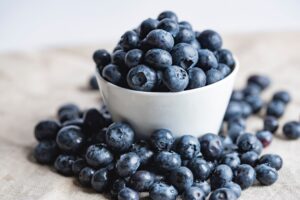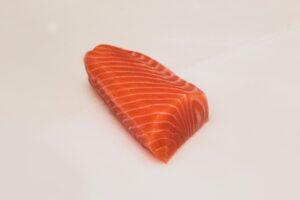Superfoods typically provide high levels of one or more health-supporting nutrients, including phytonutrients and antioxidants like vitamins A and E and beta-carotene, essential fatty acids, vitamins, minerals, or fiber.
Dog superfoods help pets fight diseases, boost energy, and maintain good overall health. They can be added to the dog’s diet; be it packaged food or home-cooked meals.
Like all people food is given to pets, the key is moderation.
Here is a list of Superfoods that I incorporate into our dogs’ diets:
Pumpkin

It is great for digestion and keeps them regular. I have not had any issues with constipation or runny stools in any of my dogs. If you buy canned pumpkin make sure you read the label-you want pure pumpkin puree, not the sugar-filled pie filling!
Here are some of the benefits of pumpkins for your dogs:
- Digestive health: Pumpkin is rich in soluble fiber, which can help to regulate bowel movements and ease constipation or diarrhea in dogs. It can also help to firm up loose stools.
- Weight management: The fiber content in pumpkin can help dogs feel full and satisfied, making it a useful addition to their diet if they need to lose weight.
- Nutritional benefits: Pumpkin is a good source of vitamins A, C, and E, as well as potassium, iron, and beta-carotene, which can help to support a dog’s immune system, skin and coat health, and overall well-being.
- Anti-inflammatory: Pumpkin contains antioxidants and anti-inflammatory compounds that can help to reduce inflammation and joint pain in dogs with conditions such as arthritis.
- Urinary health: The high water content in pumpkins can help to keep a dog’s urinary system healthy and reduce the risk of urinary tract infections.
Coconut Oil

Here are some of the benefits of coconut oil for dogs:
- Skin and coat health: Coconut oil is high in medium-chain fatty acids that can help to moisturize and nourish a dog’s skin and coat, reducing dryness, itching, and irritation. It can also help to prevent and treat skin infections and hot spots.
- Digestive health: Coconut oil contains anti-inflammatory and anti-microbial properties that can help to soothe digestive issues in dogs such as diarrhea, constipation, and inflammatory bowel disease. It can also help to improve nutrient absorption and gut health.
- Immune system support: The lauric acid in coconut oil has been shown to have antibacterial, antiviral, and antifungal properties that can help to support a dog’s immune system and protect against infections and diseases.
- Dental health: Coconut oil can be used as a natural way to promote dental health in dogs. The antimicrobial properties of coconut oil can help to prevent plaque and tartar buildup, freshen breath, and reduce the risk of gum disease.
- Energy and weight management: The medium-chain triglycerides in coconut oil are easily digested and converted into energy, making it a good supplement for active dogs or those who need to gain weight.
Eggs
 Eggs are the perfect protein. Always make sure the eggs are cooked, I alternate between hard-boiled and scrambled and I mix it with their kibble once or twice a week. Eggs promote healthy digestion, build strong bones, and provide a convenient dose of vitamins A, D, E and K. Remember eggs are only as good as the chicken they come from. We purchase our eggs from our local farmers’ market. Their hens are free-range and fed only on an organic diet.
Eggs are the perfect protein. Always make sure the eggs are cooked, I alternate between hard-boiled and scrambled and I mix it with their kibble once or twice a week. Eggs promote healthy digestion, build strong bones, and provide a convenient dose of vitamins A, D, E and K. Remember eggs are only as good as the chicken they come from. We purchase our eggs from our local farmers’ market. Their hens are free-range and fed only on an organic diet.
Here are some of the benefits of eggs for dogs:
- Protein: Eggs are a good source of high-quality protein, which is essential for building and maintaining muscle mass in dogs.
- Vitamins and minerals: Eggs contain a range of vitamins and minerals, including vitamins A, B12, D, E, and K, as well as iron and selenium, which can help to support a dog’s overall health and well-being.
- Digestive health: The riboflavin in eggs can help to improve digestion and reduce the risk of digestive problems in dogs.
- Healthy skin and coat: The biotin in eggs can help to improve the health and appearance of a dog’s skin and coat, reducing dryness, itching, and inflammation.
- Brain development: Eggs contain choline, an essential nutrient that plays a key role in brain function and development in dogs.
Blueberries
 The key to this fruit is moderation, too many can cause digestive upset. I give a few of these to my dogs in the morning after they finish their breakfast. You do not want to give them more than a “treat” amount.
The key to this fruit is moderation, too many can cause digestive upset. I give a few of these to my dogs in the morning after they finish their breakfast. You do not want to give them more than a “treat” amount.
Here are some of the benefits of blueberries for dogs:
- Antioxidants: Blueberries are high in antioxidants, which can help to protect dogs from free radical damage and may reduce the risk of certain diseases.
- Vitamins and minerals: Blueberries are a good source of vitamins C and K, as well as manganese, which can help to support a dog’s immune system, blood clotting, and bone health.
- Fiber: Blueberries are also high in fiber, which can help to promote healthy digestion and regulate bowel movements.
- Anti-inflammatory: Blueberries contain compounds that have anti-inflammatory properties, which can help to reduce inflammation and pain in dogs with conditions such as arthritis.
- Brain health: Blueberries contain nutrients that may help to support brain health and cognitive function in dogs, including anthocyanins, which are thought to improve memory and learning.
Apples
 Did you know that sliced apples can help clean your pup’s teeth? And they are filled with important nutrients. We share an apple a day with our pups and it’s great for them and for us. Give them small pieces of apple and make sure you remove the seeds and the core; they can be a choking hazard and they contain a small amount of cyanide.
Did you know that sliced apples can help clean your pup’s teeth? And they are filled with important nutrients. We share an apple a day with our pups and it’s great for them and for us. Give them small pieces of apple and make sure you remove the seeds and the core; they can be a choking hazard and they contain a small amount of cyanide.
Here are some of the benefits of apples for dogs:
- Fiber: Apples are a good source of fiber, which can help to regulate bowel movements and improve digestive health in dogs.
- Vitamins and minerals: Apples are rich in vitamins A and C, as well as potassium, which can help to support a dog’s immune system, bone health, and overall well-being.
- Fresh breath: Chewing on apples can help to clean a dog’s teeth and freshen its breath, reducing the risk of dental problems.
- Low calorie: Apples are low in calories and can be used as a healthy treat for dogs who need to lose weight.
- Antioxidants: Apples contain antioxidants that can help to reduce inflammation and protect against diseases such as cancer and heart disease in dogs.
Sweet Potatoes

Here are some of the benefits of sweet potatoes for dogs:
- Digestive health: sweet potatoes are high in fiber, which can help to regulate bowel movements and improve digestive health in dogs.
- Vitamins and minerals: Sweet potatoes are a good source of vitamins A, C, and B6, as well as potassium and calcium, which can help to support a dog’s immune system, bone health, and overall well-being.
- Low glycemic index: Sweet potatoes have a low glycemic index, which means they release sugar slowly into the bloodstream, providing a steady source of energy and reducing the risk of blood sugar spikes in dogs.
- Anti-inflammatory: Sweet potatoes contain antioxidants and anti-inflammatory compounds that can help to reduce inflammation and protect against diseases such as cancer and heart disease in dogs.
- Low fat: Sweet potatoes are low in fat and can be used as a healthy alternative to higher-fat treats for dogs who need to lose weight.
Carrots

Here are some of the benefits of carrots for dogs:
- Low calorie: Carrots are low in calories and can be used as a healthy treat for dogs who need to lose weight.
- Dental health: Chewing on carrots can help to clean a dog’s teeth and reduce the risk of dental problems.
- Digestive health: Carrots are a good source of fiber, which can help to regulate bowel movements and improve digestive health in dogs.
- Vitamins and minerals: Carrots are rich in vitamins A, C, and K, as well as potassium and calcium, which can help to support a dog’s immune system, bone health, and overall well-being.
- Anti-inflammatory: Carrots contain antioxidants and anti-inflammatory compounds that can help to reduce inflammation and protect against diseases such as cancer and heart disease in dogs.
Fish

We only eat wild-caught fish and only feed this to our dogs.
There are several differences between farm-raised fish and wild-caught fish that can impact their nutritional value, safety, and environmental impact.
- Nutritional value: Wild-caught fish tend to be leaner and contain more omega-3 fatty acids than farm-raised fish. This is because wild-caught fish feed on a diet of smaller fish and other marine organisms, which are high in omega-3s. Farm-raised fish, on the other hand, are often fed a diet of corn, soy, and other grains, which can be low in omega-3s.
- Safety: Farm-raised fish can be more prone to diseases and parasites than wild-caught fish due to their crowded living conditions. They may also be treated with antibiotics and other chemicals to prevent disease and promote growth, which can have negative health impacts. Wild-caught fish, on the other hand, are typically free from antibiotics and chemicals, although they may contain higher levels of environmental contaminants such as mercury and PCBs.
- Environmental impact: Farm-raised fish can have a larger environmental footprint than wild-caught fish. They require substantial amounts of feed, water, and energy to produce, and their waste can pollute local waterways. In addition, escaped farm-raised fish can pose a threat to wild fish populations by competing for food and habitat, and potentially introducing diseases and parasites.
- Cost: Farm-raised fish are generally less expensive than wild-caught fish, due to their ease of production and lower transportation costs.
Oily fish is the best fish. Salmon, herring, sardines, mackerel, and anchovies are bursting with omega-3 fatty acids. We give our dogs fish a couple of times a month and normally it is wild-caught salmon. They get their daily Omega-3s with our Essential OMEGAS.
Here are some benefits of feeding fish to your dogs:
- High in protein: Fish is a good source of high-quality protein, which is essential for building and repairing tissues in the body.
- Rich in omega-3 fatty acids: Fish, especially fatty fish like salmon and tuna, is a great source of omega-3 fatty acids, which can help reduce inflammation, improve skin and coat health, and support brain and eye function.
- Low in calories: Most fish are low in calories and fat, which can make them a good choice for dogs who need to lose weight or maintain a healthy weight.
- Vitamin and mineral content: Fish is also a good source of essential vitamins and minerals, including vitamins D and B12, phosphorus, and selenium.
- Variety in the diet: Feeding fish can provide variety in your dog’s diet, which can help prevent boredom and provide a range of nutrients.
It is important to introduce new foods gradually and monitor your dog’s reaction. Not all superfoods may be suitable for all dogs. It’s also advisable to consult with your veterinarian before making any significant changes to your dog’s diet.
Moderation is the key to all these Superfoods. Sometimes we think if a little is good, a lot is even better. That is not the case with these Superfoods. When available organic is always the best choice.





